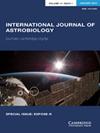天体生物学的突破性成果:需要“高风险”研究吗?
IF 1
4区 物理与天体物理
Q3 ASTRONOMY & ASTROPHYSICS
引用次数: 0
摘要
天体生物学是一项涉及大量不确定性的科学研究。这可以证明,与明显偏离主流的研究相关的智力冒险,以探索新的途径是合理的。然而,人们对这种特立独行的努力的效果知之甚少。为了更好地理解天体生物学对更多或更少风险的需求,我们调查了高风险/高影响的研究在多大程度上有助于该学科的突破性成果。我们收集了过去20年来最具影响力的天体生物学论文样本,并通过与通讯作者的联系,探讨了这些论文背后的研究项目的风险程度。我们进行了采访,以探讨他们对风险的态度在他们的工作中是如何发挥作用的,并确定他们对天体生物学中冒险的看法。我们显示,大多数选定的突破性成果来自被认为是中等或高风险的努力,风险与影响显着相关,并且大多数讨论的项目采用探索性方法。总的来说,研究人员对风险的态度呈现出一种分布,从更谨慎到更大胆,并且在天体生物学中需要更多冒险的问题上存在分歧。我们的发现最终支持在天体生物学中明确实施风险平衡投资组合。本文章由计算机程序翻译,如有差异,请以英文原文为准。
Breakthrough results in astrobiology: is ‘high risk’ research needed?
Abstract Astrobiology is a scientific endeavour involving great uncertainties. This could justify intellectual risk-taking associated with research that significantly deviates from the mainstream, to explore new avenues. However, little is known regarding the effect of such maverick endeavours. To better understand the need for more or less risk in astrobiology, we investigate to what extent high-risk / high-impact research contributes to breakthrough results in the discipline. We gathered a sample of the most impactful astrobiology papers of the past 20 years and explored the degree of risk of the research projects behind these papers via contact with the corresponding authors. We carried out interviews to explore how attitudes towards risk have played out in their work, and to ascertain their opinions on risk-taking in astrobiology. We show the majority of the selected breakthrough results derive from endeavours considered medium- or high-risk, risk is significantly correlated with impact, and most of the discussed projects adopt exploratory approaches. Overall, the researchers display a distribution of attitudes towards risk from the more cautious to the more audacious, and are divided on the need for more risk-taking in astrobiology. Our findings ultimately support the explicit implementation of a risk-balanced portfolio in astrobiology.
求助全文
通过发布文献求助,成功后即可免费获取论文全文。
去求助
来源期刊

International Journal of Astrobiology
地学天文-地球科学综合
CiteScore
3.70
自引率
11.80%
发文量
45
审稿时长
>12 weeks
期刊介绍:
International Journal of Astrobiology is the peer-reviewed forum for practitioners in this exciting interdisciplinary field. Coverage includes cosmic prebiotic chemistry, planetary evolution, the search for planetary systems and habitable zones, extremophile biology and experimental simulation of extraterrestrial environments, Mars as an abode of life, life detection in our solar system and beyond, the search for extraterrestrial intelligence, the history of the science of astrobiology, as well as societal and educational aspects of astrobiology. Occasionally an issue of the journal is devoted to the keynote plenary research papers from an international meeting. A notable feature of the journal is the global distribution of its authors.
 求助内容:
求助内容: 应助结果提醒方式:
应助结果提醒方式:


